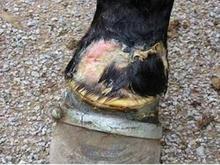The American Veterinary Medical Association and the American Association of Equine Practitioners have joined together in support of the Prevent All Soring Tactics Act (PAST), H.R. 1518. The bill seeks to eliminate the abusive act of soring horses by improving the U.S. Department of Agricultureâs enforcement capabilities and strengthening penalties against violators, among other provisions.

Horse's leg - Injuries caused by soring
The American Veterinary Medical Association and the American Association of Equine Practitioners joined together in support of the Prevent All Soring Tactics Act (PAST), H.R. 1518.
© 2013 by Fitch
Soring is the intentional infliction of pain in Tennessee Walking Horses, Spotted Saddle Horses, and Racking Horses to produce a high-stepping, unnatural gait. Despite being illegal for more than 40 years, insufficiencies in funding and other resources needed for enforcement at the federal level have contributed to a culture of corruption where this abusive, unethical practice remains prevalent in shows and auctions in certain pockets of the country.
âSoring of horses is an inhumane practice that veterinarians are, unfortunately, still seeing. It has crippling physical and mental effects on horses,â said Dr. Douglas Aspros, veterinarian and AVMA president. âItâs sad when winning a show takes precedence over the health and welfare of the horse. As veterinarians, we simply canât stand by and allow horses to be abused. We encourage Congress to quickly pass H.R. 1518 and put an end to the inhumane and unethical practice of soring, once and for all.â
Specifically Bans Act of Soring of Horses, H.R. 1518:
- Makes the actual act of soring, or directing another person to cause a horse to become sore, illegal, whereas the original act only banned showing, transporting, or auctioning a horse that was sore, not the actual practice;
- Prohibits the use of action devices (e.g., boot, collar, chain, roller, or other device that encircles or is placed upon the lower extremity of the leg of a horse) on any limb of Tennessee Walking Horses, Spotted Saddle Horses, or Racking Horses at horse shows, exhibitions, sales or auctions and bans weighted shoes, pads, wedges, hoof bands, or other devices that are not used for protective or therapeutic purposes;
- Increases civil and criminal penalties for violations, and creates a penalty structure that requires horses to be disqualified for increasing periods of time based on the number of violations;
- Allows for permanent disqualification from the show ring after three or more violations; and
- Requires the USDA (rather than the current structure of horse industry self-regulation) to license, train, assign and oversee inspectors to enforce the Horse Protection Act.
"Soring is one of the most significant equine welfare issues in the United States," said AAEP President Dr. Ann Dwyer. "Federal legislation is the only action that will end this decades-long abuse of horses, and we urge all within the veterinary and horse-owning communities to join us in supporting this billâs passage.â
For more information on the AVMA and AAEPâs efforts to end soring, visit the AVMA's Soring Resource Page.
The AVMA, founded in 1863, is one of the oldest and largest veterinary medical organizations in the world, with more than 84,000 member veterinarians worldwide engaged in a wide variety of professional activities and dedicated to the art and science of veterinary medicine. For more information, visit www.avma.org.
The American Association of Equine Practitioners, headquartered in Lexington, Ky., was founded in 1954 as a non-profit organization dedicated to the health and welfare of the horse. Currently, the AAEP reaches more than 5 million horse owners through its nearly 10,000 members worldwide and is actively involved in ethics issues, practice management, research and continuing education in the equine veterinary profession and horse industry.
